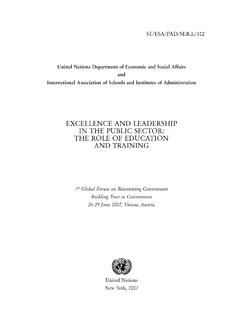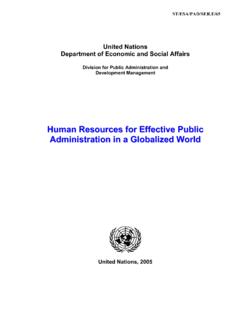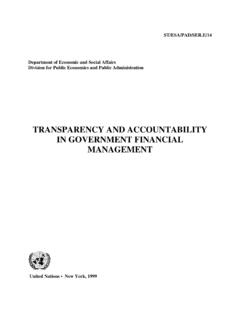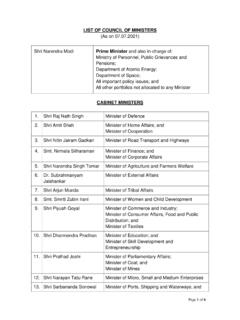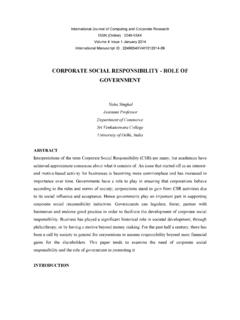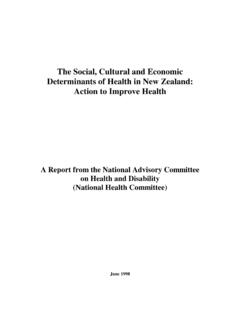Transcription of Promoting Ethics in the Public Service
1 ST/ESA/ Department of Economic and social Affairs Division for Public Economics and Public Administration Promoting Ethics in the Public Service United Nations New York, 2000 ii Notes The designations employed and the presentation of the material in this publication do not imply the expression of any opinion whatsoever on the part of the Secretariat of the United Nations concerning the legal status of any country, territory, city or area, or of its authorities, or concerning the delimitation of its frontiers or boundaries. The designations developed and developing economies are intended for statistical convenience and do not necessarily imply a judgement about the stage reached by a particular country or area in the development process. The term country as used in the text of this publication also refers, as appropriate, to territories or areas. The term dollar normally refers to the United States dollar ($).
2 The views expressed are those of the individual authors and do not imply any expression of opinion on the part of the United Nations. Enquiries concerning this publication may be directed to: Mr. Guido Bertucci Director Division for Public Economics and Public Administration Department of Economic and social Affairs United Nations, New York, NY 10017, USA Fax: (212) 963-9681 iii ForewordForewordForewordForeword This report is the product of a policy dialogue which took place in Brasilia, a Colloquium on Promoting Ethics in the Public Service , held in December 1997. Upon request from the Govern-ment of Brazil, the United Nations Department of Economic and social Affairs (UN/DESA), Divi-sion for Public Economics and Public Admini-stration (DPEPA) provided substantive input to the Colloquium s programme. UN/DESA s involvement was part of its ongoing work on the issue of Public Service Ethics , under the rubric of professionalism and leadership in civil Service systems.
3 Brazil launched a reform of the state in 1995 and is currently re-examining the role of the state. As part of this exercise, Brazil has also been making a conscious shift towards a managerial admin-istration, with a greater results-orientation than its previously legal-rational model. It has been mod-ernizing the Public Service , emphasizing quality Service , performance and professionalism. Given this overall context, the Government of Brazil considered Ethics in the Public Service to be a timely issue. The integrity of Public servants has a direct bearing, not only on their performance but also on Public perception of government credibility. This report has been prepared by the Governance and Public Administration Branch of the Division for Public Economics and Public Administration (GPAB/DPEPA). The Division would like to acknowledge the contributions of Ms. Elia Yi Armstrong, a UN/DESA Consultant. It would also like to acknowledge the work of Mr.
4 Francisco Amorim, UN/DESA Interregional Adviser, who was instrumental in collaborating with the Government of Brazil in the conception and planning of the event. The Division would like to acknowledge the Brazilian Council of State Reform for its partner-ship. Mr. Joao Piquet Carneiro, Vice-President, prepared a summary of the Colloquium, which is included in this publication. It would also like to acknowledge the Brazilian Ministry of Federal Administration and State Reform (MARE), the United Nations development Programme office in Brazil, the Bank of Brazil and Hyundai Company for their sponsorship. minister Luiz Carlos Bresser Pereira of MARE presented a paper on civil Service Ethics , which is also included in this publication. The Division would like to thank the international consultants who prepared the papers which were presented in the Colloquium: Professor Gerald Caiden of the University of Southern California and Mr.
5 Peter Unwin of Transparency Interna-tional-United Kingdom. It would also like to thank Mr. Gary Davis, Deputy Director, for presenting the paper prepared by the United States Office of Government Ethics . Further, the Division would like to thank the international discussants, Mr. Howard Wilson, Canadian Ethics Counsellor, and Mr. Janos Bertok, Administrator, Public Management Service (PUMA), the Organisation for Economic Cooperation and development (OECD), for their commentaries and presentations of experience of other countries. Guido Bertucci Director Division for Public Economics and Public Administration Department of Economic and social Affairs Contents Contents Contents Contents Executive 1 Introduction .. 3 Part I Colloquium Summary .. 7 Part II Contributed Papers Higher Civil Service s Ethics .. 14 by minister Luiz Carlos Bresser Pereira Brazilian Federal Administration and State Reform The Essence of Public Service 21 by Professor Gerald Caiden University of Southern California Ethics Programmes as a Means of Fighting 32 by the United States Office of Government Ethics The Role of the Private Sector and Civil Society.
6 39 by Mr. Peter Unwin Transparency International United Kingdom Executive SummaryExecutive SummaryExecutive SummaryExecutive Summary Ethics is gaining prominence in the discourse about governance today. There is a perception that standards in Public life are in decline. This raises questions about the costs of misconduct on the part of those who have been entrusted with guarding Public interest and resources. These costs are losses in trust and confidence in Public institutions and losses in precious resources which were meant to support the economic and social development of nations and peoples. There is a move worldwide to restore a measure of trust and integrity in Public institutions and officials, to safeguard democracy and promote better governance. Like many other countries, Brazil is currently re-examining the role of the state, after having launched a reform of the state in 1995. As part of this exercise, Brazil has also been making a conscious shift towards a managerial admini-stration, with a greater results-orientation than its previously legal-rational model.
7 It has been modernizing the Public Service , emphasizing quality Service , performance and professionalism. Given this overall context, the Government of Brazil considered Ethics in the Public Service to be a timely issue. The integrity of Public servants has a direct bearing, not only on their performance but also on Public perception of government credibility. At the invitation of the Government of Brazil, United Nations Department of Economic and social Affairs (UN/DESA), Division for Public Economics and Public Administration (DPEPA) co-organized a national colloquium in Brazil on Promoting Ethics in the Public Service , in 1997. In Brasilia, 300 senior federal and state Public servants as well as representatives from the business community, the media, the academy, and professional associations discussed launching a national Ethics initiative in the Public Service . The United Nations involvement indicated its interest in and a mandate for assisting Member States to improve their Public administration in order to better achieve their economic and social development goals.
8 For fifty years, the United Nations Programme in Public Administration and Finance has been providing research and analysis to inter-governmental bodies and policy advice and technical cooperation to Member States, upon request. Although the issues discussed during the Colloquium were placed in the Brazilian context, they are universal in scope. The programme started with the questions, what are professional Ethics and, more specifically, what are civil Service Ethics ? This was followed by a discussion of the values which embody the essence of Public Service professionalism. Then a very concrete example of an Ethics programme was given to illustrate how these values could be translated into a system of workable, manageable and enforceable standards. Finally, the importance of involving actors outside of the Public Service the private sector and civil society and their roles were debated. In conclusion, the participants recommended a number of specific measures to promote Ethics in the Public Service , including fostering Public involvement, improving the legal framework and instituting Ethics as an integral part of human resources management in the Public Service .
9 The Colloquium witnessed presentations and discussions that are relevant not only to Brazil but to other countries, in either introducing or making changes to Ethics management in their Public Service . iv Promoting Ethics in the Public Service IntroductionIntroductionIntroductionIntr oduction Ethics and governance Ethics is gaining prominence in the discourse about governance today. There is a perception that standards in Public life are in decline. This raises questions about the costs of misconduct on the part of those who have been entrusted with guarding Public interest and resources. These costs are losses in trust and confidence in Public institutions and losses in precious resources which were meant to support the economic and social development of nations and peoples. There is a move worldwide to restore a measure of trust and integrity in Public institutions and officials, to safeguard democracy and promote better governance.
10 It could be argued that the perception of a fall in Public standards is linked to the shifting role of the state, which is undergoing tremendous reform. Globalization, technological advances, spreading democratization and fiscal crises are challenging states to deal with strong external forces, be smart in serving its citizenry, devolve power, and divest itself of obsolete activities. As a result, the Public Service , as an institution, is under pressure to transform itself to respond to these changes. As Public servants are asked to take on new and sometimes conflicting roles, there is a need for a cost-effective structure and an encouraging culture to enforce standards and guide their behavior. The role of the United Nations The United Nations has an interest in these new challenges which Public services are facing every-where and a mandate for taking action. It has been assisting Member States to improve their Public administration in order to better achieve their economic and social development goals.

